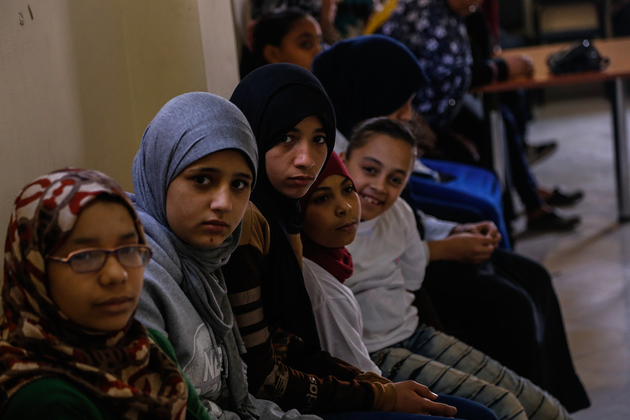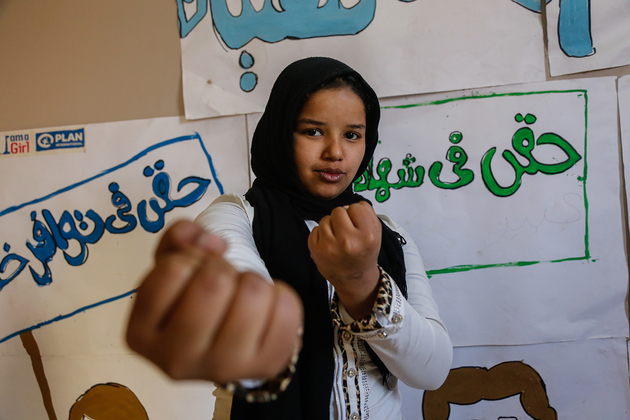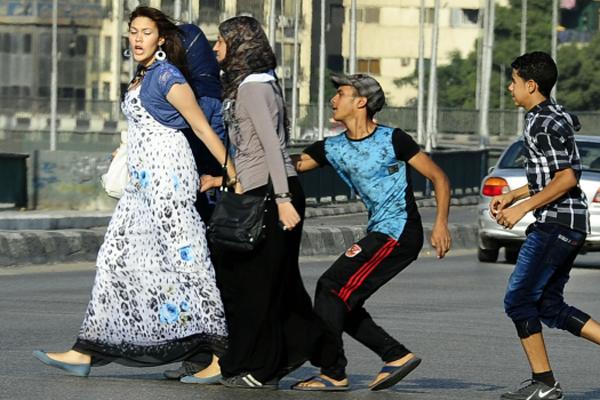The Egyptian man who groped 23-year-old Rania Fahmy as she walked down the street in Upper Egypt last August will probably be wishing he’d done something different that day.
Last month, he was sentenced to three years in prison, making Fahmy the first young woman in the highly conservative region to have secured a conviction against a sexual harasser.
“It all started while I was out on an August Friday to do some shopping for my house, when a guy sexually harassed me in the street,” Fahmy said on Egyptian television. “I shouted at him but he started to beat me so I hit him with my handbag,”
The CCTV footage showing Rania repeatedly whacking the harasser with her bag is inspiring to watch.
But she didn’t stop there. Despite allegedly being bribed to drop the case, Fahmy was determined to see her harasser brought to justice, campaigning tirelessly until his prosecution last month. This week she was honoured by Egypt’s National Council for Women.
Fahmy’s bravery and self-belief is why she’s exactly the kind of role models girls in Egypt need.
Because the reality is that most Egyptian girls don’t tell anyone if they’re harassed. While a UN study found that 99% of Egyptian girls and women have been harassed, they also found that only 6.6% of victims request help from security forces at the scene of the harassment. The reasons are many.
On the one hand, girls who speak out are regularly punished. They’re often regarded as being to blame for their own harassment – more than three-quarters of sexual harassers cited a girl’s “provocative” dress as a legitimate reason for their actions, according to a study by UN Women and the NGO Promundo.
“In general the community blames girls if they’re harassed and they speak out about it,” says Nada, a 14-year-old schoolgirl who lives in the slum community of Ezbet Khairallah in Cairo.

“If a girl is on a bus and a man touches her, the bystanders will say that he didn’t do anything, that it must have been a mistake and they’ll start blaming the girl. The community blames girls for anything bad that happens to them.”
If they talk back to a harasser, even just to tell them off, it’s claimed that they welcome the attention, says Dr Hani Henry, a psychology professor at the American University in Cairo who has researched the phenomenon.
And according to Plan International Egypt, if their parents find out they spoke to men in public, there’s even a chance they’ll be pulled out of school.
“Many girls are pulled out of school by their parents due to fears of harassment damaging the family’s honour,” explains Dr Jacinthe Ibrahim, a programme manager at the child rights organisation in Cairo.
“They’re typically scared she won’t be approached by prospective husbands if she’s seen in the company of men. It can push girls not to report harassment or even rape.”
Then there’s the fact that too often girls’ and women’s complaints are met with inaction. Despite harassment being criminalised in Egypt in 2014, cases like Fahmy’s where perpetrators are brought to justice are few and far between.
Add to this the fact one in 10 women surveyed by the UN said they’d been harassed by the very policeman they went to for help and it’s unsurprising that most girls and women would rather keep quiet.
This has to change. Egypt’s girls and women have the right to walk down the street with the same safety and dignity their menfolk enjoy.
But unless they report crimes when they happen, the abuse is never going to stop.
Plan International’s Safer Cities project is working with communities in Cairo to transform neighbourhoods into safe places where girls are respected and can go to school or work without fear of violence or harassment.
The project, from which 1,000 Cairo girls have benefitted since 2015, provides girls with a platform to discuss the problems they face and the opportunity to provide input into the development of their neighbourhood through regular meetings with the authorities. Activities include self defence classes which teach girls how to protect themselves.

Aya, 13, learns self defence to protect herself against street harassment
Naturally, girls and women will only start speaking out when they know they’ll be taken seriously. They need parents who put the safety, wellbeing and education of their daughters before the family’s perceived honour and reputation. Parents who recognise that their value goes far and beyond who they’ll marry one day. And men and boys who step up to help when they see a girl in trouble in the street.
They also need a criminal justice system they can trust. Which will mean increasing the numbers of female police officers on the streets and training more officers so they know how to handle harassment victims with the care they deserve.
Mina Samir, a 25-year-old police officer from Cairo has set a formidable example for others with his Facebook advice service for victims of harassment. Judging by the thousands of messages Samir receives every week, more tech platforms are needed where girls and women can access support and information about harassment anonymously and in the safety of their homes.
Girls and women also need to be able to rely on police stations to be safe spaces and know that officers who step out of line will face the full force of the very law they’re policing.
Fahmy’s case shows that Egyptian girls and women can stand up for their rights. The messages of praise she received on social media are proof there’s growing support for those who speak out.
Unlike her, most girls can’t do it alone though. Let’s stand with them.

